Generative Engine Optimization (GEO)
Generative Engine Optimization (GEO) represents the next evolution in digital visibility, where success is defined not just by ranking on search engines, but by being cited, summarized, and recommended by AI-driven platforms. As tools like ChatGPT, Google’s AI Overviews, and Perplexity reshape how users discover information, healthcare professionals must adapt their online strategies to stay competitive. GEO focuses on optimizing content for generative models that synthesize trustworthy answers, ensuring your practice remains the authoritative source AI engines turn to. Rosemont Media is a website marketing firm focused on integrating GEO strategies into every digital campaign to help plastic surgeons, dentists, and other medical professionals thrive in the new era of intelligent search.
The Next Evolution of Search – From SEO to GEO
The digital marketing landscape is evolving rapidly, and traditional SEO is no longer enough. While SEO focused on ranking for specific keywords, AI-powered tools like ChatGPT, Bing Copilot, Gemini, and Perplexity have transformed how users seek information. Generative Engine Optimization (GEO) represents the next frontier, ensuring your practice is visible, credible, and cited within AI-driven search environments. Building on the progression from SEO (search engine optimization) to AEO (Answer Engine Optimization) and now GEO, this approach aligns content with AI systems that synthesize, summarize, and reference trusted sources rather than simply ranking pages.
For healthcare practices, adopting GEO isn’t just a technical upgrade. In fact, it directly affects patient engagement and lead generation. As patients increasingly rely on AI tools to research treatments, providers, and procedures, practices implementing GEO position themselves as authoritative sources that AI platforms can reference. This boosts both credibility and visibility in an era of synthesized answers. Rosemont Media helps healthcare providers navigate this shift, ensuring digital strategies keep pace with AI-driven search while focused on maintaining compliance, accuracy, and patient trust.
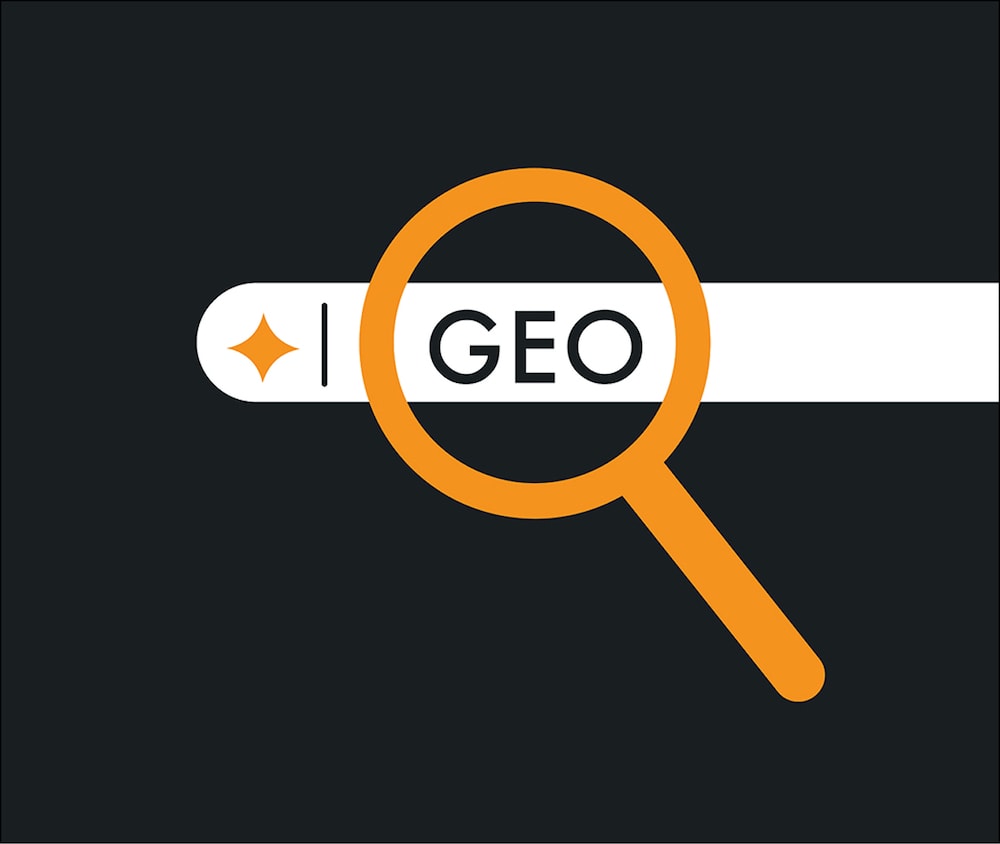
What Is Generative Engine Optimization (GEO)?
Generative Engine Optimization, or GEO, is the strategic process of designing and optimizing content specifically for AI-powered search tools and generative engines. Unlike traditional SEO, which focuses primarily on ranking for keywords in search engine results pages (SERPs), GEO emphasizes ensuring that your content is recognized, trusted, and cited by artificial intelligence systems that generate summarized responses for users. In essence, GEO positions your practice as a reliable source that AI tools can pull from when answering patient queries.
How Generative Engines Approach Content
Generative search engines, including ChatGPT, Bing Copilot, Gemini, and others, operate differently than traditional search engines:
- They synthesize information from multiple sources to provide concise, natural-language answers.
- They prioritize content that is informative, well-structured, authoritative, and easy to understand.
- AI platforms evaluate clarity, factual accuracy, and reliability when deciding which sources to cite.
GEO Goals for Healthcare Practices
- Establish your practice as a trusted source for AI-generated answers.
- Balance technical accuracy with patient-friendly language.
- Optimize content with:
- Structured data
- Clear headings
- Verified credentials
- Credible citations
- Increase the likelihood that your procedures, educational resources, and service pages are referenced in AI-generated responses.
Why GEO Matters
GEO represents a new paradigm in digital marketing, going beyond traditional plastic surgery SEO and dental SEO strategies. AI-driven search results now prioritize accuracy, clarity, and authority. For healthcare professionals, GEO works to ensure potential patients access trustworthy information directly linked to your practice, helping you stand out in an AI-influenced search landscape.
The Rise of Generative Search and Its Impact on Healthcare Marketing
The emergence of generative search has transformed how patients research healthcare services and providers. Unlike traditional search engines, which display a ranked list of links, generative AI tools synthesize information from multiple sources to provide direct, conversational answers. Patients can now ask complex, nuanced questions like, “What’s the safest facelift technique for someone over 50?” or “Who are the top-rated plastic surgeons near me?” and receive summarized guidance that often influences their decision-making before they even visit a website.
For healthcare marketers, this shift means visibility is no longer solely about high keyword rankings. Generative AI emphasizes content comprehension, credibility, and authority. If your practice’s content is well-structured, accurate, and clearly communicated, AI systems are more likely to cite your pages in their responses, effectively delivering your expertise directly to potential patients. This changes the game: even if a user doesn’t click through to your website immediately, your practice is still gaining exposure and establishing trust.
The rise of generative search also highlights the importance of patient-centric content. AI models prioritize clarity, relevance, and the ability to answer questions thoroughly. Practices that focus on educational resources, FAQs, and procedure explanations in accessible language are more likely to be referenced by AI systems. Additionally, local search intent remains crucial; generative tools often combine geographic context with medical insights, making accurate location and service information vital for capturing nearby patients.
Ultimately, healthcare providers must adapt to this new landscape to remain competitive. At the same time, it’s important to remember that generative search doesn’t replace the need for traditional SEO; rather, it complements it by rewarding authoritative, transparent, and patient-focused content. By integrating GEO strategies, practices can ensure they are seen as trusted sources, build credibility, and maintain visibility in the evolving AI-driven search environment.
GEO vs. SEO vs. AEO: Understanding the Differences
Generative Engine Optimization (GEO) represents the next stage in search evolution, but it’s important to understand how it relates to traditional SEO and Answer Engine Optimization (AEO). Each approach targets different aspects of visibility, and seeing the distinctions clarifies why adopting GEO is essential for healthcare practices.
SEO – Search Engine Optimization:
Traditional SEO focuses on ranking web pages for specific keywords in search engine results pages (SERPs). Key tactics include optimizing meta tags, producing high-quality content, building backlinks, and improving site speed. The goal is algorithmic visibility: if a user searches for “breast augmentation,” well-optimized pages are more likely to appear at the top of Google’s organic results.
AEO – Answer Engine Optimization:
AEO emerged with the rise of featured snippets, voice search, and direct answers in search engines. Rather than just ranking pages, AEO aims to have content presented as the answer box or in the “People Also Ask” section. Techniques include structured Q&A formatting, concise and authoritative answers, and schema markup that signals intent (“schema markup” is structured data that enhances a search engine’s understanding of your website content). For example, a snippet might answer, “How long does rhinoplasty recovery take?” directly in search results, even without a user clicking through.
GEO – Generative Engine Optimization:
GEO shifts the focus from simply ranking or being featured in snippets to becoming a trusted source for AI-generated summaries. Generative AI models like ChatGPT, Gemini, and Bing Copilot synthesize information from multiple sources. To succeed in GEO, content should generally:
- Demonstrate clear expertise and authority
- Be structured for AI comprehension, with headings, FAQs, and summaries
- Provide accurate, well-cited information that AI models can confidently reference
While SEO and AEO target human users and search interface features, GEO is about AI understanding and citation. Integrating all three can increase the potential for your content to be discoverable and evaluated as authoritative and usable by both people and the next generation of AI-powered search tools.
| Approach | Focus | Key Techniques | Example Outcome |
|---|---|---|---|
|
SEO
|
Keyword rankings
|
On-page optimization, backlinks, content quality
|
Appear at top of SERPs
|
|
GEO
|
Direct answers
|
Q&A content, snippets, structured data
|
Featured snippet or PAA answer
|
|
AEO
|
AI trust & citation
|
Structured content, clarity, authority, citations
|
Cited in AI-generated responses
|
Key Elements of Generative Engine Optimization
Generative Engine Optimization (GEO) relies on several foundational elements that can ensure your content is discoverable, trustworthy, and easily synthesized by AI systems. Unlike traditional SEO, GEO focuses not only on keyword targeting but also on structuring content in ways that AI and large language models (LLMs) can understand, summarize, and cite confidently. For healthcare providers, this structured approach is critical to maintain authority while remaining compliant and patient-focused.
-
Structured Data and Semantic Markup
Implementing schema markup and other semantic tools helps AI identify key information about your content. For example, marking up procedure pages, provider credentials, and FAQ sections allows LLMs to quickly interpret your expertise and provide accurate references in responses.
-
Clear, Conversational Language
Generative AI models prioritize content that mirrors natural human conversation. Using accessible, patient-friendly language enhances AI comprehension and increases the likelihood that your content is presented as a summarized answer to queries. Avoid overly technical jargon unless necessary, and provide clear explanations when medical terms are used.
-
Content Architecture and Topic Clustering
Organizing content with logical hierarchies, Q&A formats, and topic clusters improves AI navigation. Hub pages linked to supporting “spoke” content can ensure that every subtopic, such as recovery timelines or procedure risks, is easily found and referenced. This also mirrors the way AI models draw from multiple sources to generate comprehensive answers.
-
Author Credentials and Source Transparency
Demonstrating expertise, such as listing board certifications, published research, and years of experience, signals credibility. AI engines prioritize content authored by verified experts, making transparency essential for healthcare content.
-
Multimedia Optimization
Images, videos, and transcripts should be optimized with descriptive alt text and structured captions. This allows AI to include visual information in generated responses, enhancing the richness of the content it presents while improving accessibility.
By combining these elements, healthcare practices can create content that aligns with AI expectations while still serving human readers. A GEO-focused strategy can maximize the potential for your expertise to be recognized and frequently cited by AI engines, which can ultimately boost both digital visibility and patient trust.
AI Overviews, Snippets, and Knowledge Panels: Where GEO Takes Effect
Generative Engine Optimization (GEO) is not just a backend strategy—it directly affects where and how your practice appears in AI-powered search results. Unlike traditional search listings, AI-driven platforms summarize content, answer questions, and sometimes highlight authoritative sources in prominent features such as AI Overviews, featured snippets, People Also Ask (PAA) boxes, and knowledge panels. Understanding these placements helps practices optimize their content for maximum visibility.
AI Overviews
Platforms like Google’s AI Overviews (previously known as the Search Generative Experience-SGE) or Bing Copilot compile content from multiple sources into concise answers. By structuring your content for clarity, accuracy, and authority, you increase the likelihood that your practice will be cited in these AI-generated summaries. High-quality structured data, clear headings, and expert-authored content all improve inclusion chances.
Featured Snippets and People Also Ask (PAA)
These are traditional SEO elements that have evolved to support AI-driven search. Featured snippets provide direct answers at the top of search results, while PAA boxes display related questions that AI pulls from reputable sources. Using question-and-answer formatting, bullet points, and succinct explanations improves your content’s chances of being selected.
Knowledge Panels
These panels display authoritative information about people, organizations, or businesses, often sourced from structured data and verified citations. For healthcare providers, creating and maintaining accurate profiles with consistent schema, proper citations, and updated information increases the chance your practice appears in these high-visibility panels.
Techniques to Maximize Inclusion
- Consistently mark up content with relevant schema types (such as “FAQPage,” “Physician,” and related classifications).
- Keep content accurate, detailed, and well-cited.
- Format Q&A sections for AI comprehension, often using short paragraphs and lists.
- Update pages regularly to maintain freshness and credibility.
By strategically targeting these AI-driven visibility features, healthcare practices can extend their reach beyond traditional search rankings, positioning themselves as trusted sources that generative engines frequently cite. GEO allows your practice to appear in the summaries and panels patients increasingly rely on when making healthcare decisions.
GEO for Plastic Surgeons and Dentists
Generative Engine Optimization (GEO) strategies must be tailored to the unique needs of healthcare providers, particularly plastic surgeons and dentists. Unlike many general businesses, medical practices require content that balances visibility, patient education, and regulatory compliance, making specialized GEO approaches essential for meaningful results.
GEO for Plastic Surgeons
Procedure pages inside a plastic surgery website, such as those that cover facelift surgery, breast augmentation, rhinoplasty, and tummy tuck surgery to name just a few, serve as core content hubs. By structuring these pages with clear headings, Q&A sections, and authoritative information, surgeons increase their chances of being cited in AI-generated answers. Key tactics include:
- Highlighting credentials and experience to signal trustworthiness.
- Integrating structured data like“FAQPage” and “Physician” schema.
- Providing detailed, patient-focused explanations, including recovery timelines and potential risks.
- Incorporating multimedia elements, such as before-and-after galleries, videos, and procedure diagrams, to enhance comprehension by AI and patients alike.
GEO for Dentists
Similarly, dental websites can optimize service pages (e.g., porcelain veneers, dental implants, orthodontics) and educational content for AI-driven queries. Conversational, question-and-answer content helps capture long-tail searches like “how long does teeth whitening last?” or “best dentist near me for Invisalign.” Clear, concise language, verified citations, and structured data can ensure generative engines recognize the practice as a credible source.
Compliance and Accuracy
Healthcare-related GEO content must adhere to HIPAA, FDA, and professional guidelines. Patient privacy, accurate representation of procedures, and avoidance of misleading claims are non-negotiable. Structured, compliant content not only helps safeguard the practice legally but also increases trust and AI citation potential.
Case Examples
For instance, a plastic surgeon optimized for GEO might see their facelift page included in AI Overviews summarizing recovery options, while a dental practice’s educational content on dental implants could appear in People Also Ask boxes. Both outcomes increase visibility and patient engagement without relying solely on traditional search rankings.
By customizing GEO strategies for medical and dental practices, Rosemont Media can help clients dramatically increase the chances that they are not only found by patients, but also cited as authoritative, reliable sources in generative search results.
The Role of Structured Data, Schema, and Content Formatting in GEO
Structured data and schema markup are essential components of Generative Engine Optimization (GEO). They act as a language that AI engines can easily interpret, helping LLMs understand the context, purpose, and credibility of your content. For plastic surgeons and dentists, proper implementation of structured data can significantly enhance the likelihood of appearing in AI summaries, featured snippets, and knowledge panels.
Healthcare-Relevant Schema Types
Some of the most useful schema types for medical content include:
- Physician – Highlights your credentials, specialties, and affiliations.
- FAQPage – Structures commonly asked questions and answers in a way AI can easily parse.
- Review & Rating – Demonstrates patient satisfaction and builds trust signals.
Content Formatting Best Practices
Clear, structured formatting makes content easier for AI models to digest. This includes:
- Headings and Subheadings: Organize content logically, making it scannable for both users and AI.
- Bullet Points and Numbered Lists: Present key information succinctly for better comprehension.
- Clean, Semantic HTML: Avoid cluttered code or unnecessary scripts that may confuse AI crawlers.
Microdata for Enhanced AI Understanding
Embedding microdata can help AI systems accurately categorize and summarize content. For instance, marking procedure details, step-by-step guides, or before-and-after galleries with relevant schema signals authority and relevance.
By implementing structured data, proper schema, and clean formatting, your website not only improves AI visibility but also enhances user experience, engagement, and trustworthiness. These technical optimizations serve as a foundation for successful GEO, allowing generative engines to confidently reference your content as a reliable source.
The Human Element: Why Authenticity and Expertise Still Matter
Even as Generative Engine Optimization (GEO) relies on AI to discover, summarize, and present content, the human element remains irreplaceable. AI models prioritize trustworthy, expert-driven sources, meaning that firsthand, authentic content from qualified professionals is more likely to be cited or summarized accurately. For plastic surgeons and dentists, this underscores the importance of demonstrating real expertise, credibility, and transparency on your website.
Verified Expertise is Key
Search engines and LLMs, including Google’s AI and ChatGPT, increasingly evaluate author credentials and content accuracy. Pages authored by recognized professionals, with clear bios, qualifications, and industry affiliations, are typically given more weight when AI models decide which content to reference.
Authentic Human Content
AI-generated summaries rely on existing high-quality content. Unique insights, patient-focused explanations, thought leadership pieces authored by your team, and expertly-crafted, relevant, and original content throughout your website can set your practice apart. For example, detailed procedural guides, expert commentary, and nuanced explanations of treatment options show that your content is based on experience, not generic information.
Rosemont Media’s Editorial Standards
To help ensure GEO success while maintaining compliance and credibility, we enforce strict editorial standards:
- All content is reviewed for medical accuracy and clarity.
- Experienced writers conduct intensive research and focus on developing high-quality, fact-based, and relevant content
- A strong emphasis is placed on highlighting professional qualifications and credentials
- Content is customized to each client’s practice with the goal of thoroughly explaining procedures and treatment processes
- Ethics, expertise, education, and a “Content as a Public Service” approach remains the benchmark for Rosemont Media’s writing team
By combining expert human insight with technical GEO strategies, your content can become both AI-friendly and trustworthy to prospective patients. Authenticity and verified expertise can not only increase your visibility in generative search, but also strengthen your reputation management results, build patient confidence, and enhance long-term SEO performance.
Case Studies: How Rosemont Media Clients Are Positioned in AI Search
Demonstrating the real-world impact of Generative Engine Optimization (GEO) is critical for understanding its value. At Rosemont Media, we’ve helped numerous clients in a range of plastic surgery, dental, and healthcare fields achieve prominent placements in AI-driven search environments. These placements can increase visibility, credibility, and patient inquiries by positioning clients as trusted sources for accurate medical information.
Client Examples
-
Plastic Surgery Practice
Two of Rosemont Media’s clients specializing in plastic surgery and cosmetic enhancement have been listed in the AI Overview results under a search for this popular question: “Can diet reduce large breast size?”:
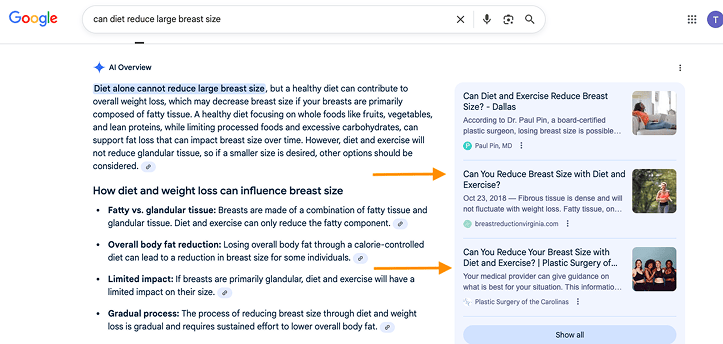
Another Rosemont Media client soared to the top of the AI Overview result under a search for “rhinoplasty cost westchester”:
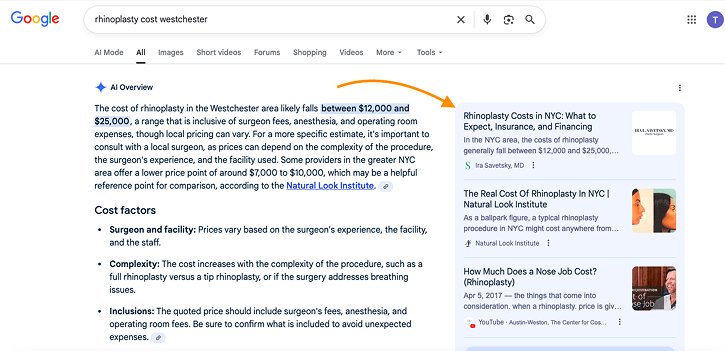
-
Dental Practice
Some of Rosemont Media’s dental clients have experienced similar results, with major pages appearing in AI-generated overviews for popular search terms. This one appeared (twice) in the AI Overview results for “CEREC crowns newport beach”:
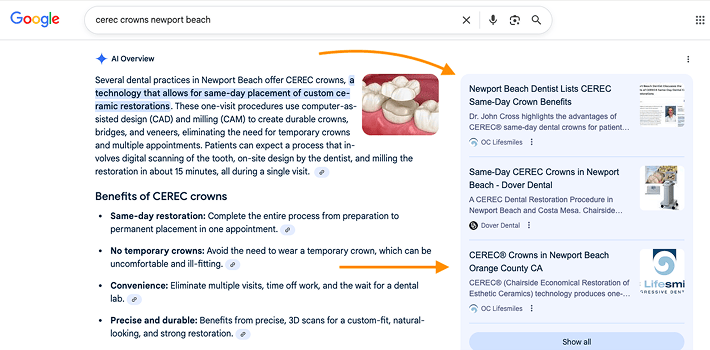
And this next example shows one of our clients appearing in the AI Overview results for “how much do veneers cost in scottsdale”:
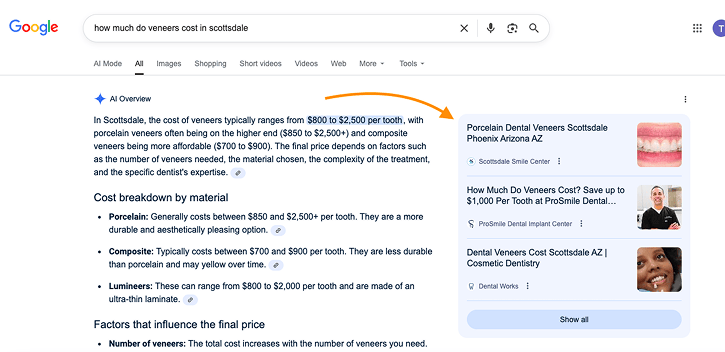
Techniques That Can Drive Success
- Implementing structured schema, including “FAQPage” and “Physician” markup.
- Highlighting author expertise and including credentials prominently.
- Maintaining factual, patient-focused content that aligns with generative AI trust signals.
- Regularly updating content to ensure continued AI relevance and accuracy.
These case studies illustrate that GEO isn’t theoretical — it delivers measurable results. By combining strategic content optimization, technical schema implementation, and human expertise, Rosemont Media positions clients to appear in AI-generated summaries, knowledge panels, and other generative search features. The outcomes are tangible: increased patient engagement, improved brand identity and authority, and enhanced online visibility in an evolving digital landscape.
Tracking GEO Results and Measuring Impact
Measuring the effectiveness of Generative Engine Optimization (GEO) is critical to understanding its impact on your practice’s visibility and patient acquisition. Unlike traditional SEO, GEO requires tracking not only standard website metrics but also how AI engines reference, summarize, and present your content in generative search results.
Key Metrics to Monitor
- AI Citations and Mentions: Track when your website or content is referenced by AI platforms like ChatGPT, Bing Copilot, or Google’s AI Overviews. These citations indicate authority and relevance in generative search.
- Search Visibility for Conversational Queries: Monitor rankings for natural-language, AI-friendly queries such as “best rhinoplasty techniques near me” rather than just traditional keywords.
- Traffic from AI-Influenced Sources: Identify how much referral traffic originates from AI-driven search outputs or knowledge panels.
- Engagement Metrics: Keep an eye on session duration, bounce rates, and click-throughs from content optimized for generative AI, as these indicate how users interact with AI-referenced content.
- Conversion Tracking: Measure leads, consultation requests, or form submissions influenced by GEO-optimized content to understand ROI.
Tools and Strategies for Measurement
- Google Analytics & Search Console: Still essential for baseline metrics, but integrate AI-driven query tracking for more precise insights.
- Custom Reporting Dashboards: Combine data from AI platforms, CRM systems, and website analytics to see the full impact of GEO efforts.
- Regular Audits: Conduct routine content and technical audits to ensure your AI-targeted content remains accurate, relevant, and discoverable.
By systematically tracking these indicators, practices can evaluate the effectiveness of GEO strategies, refine content, and maintain authority in AI-driven search. Data-driven monitoring can help ensure that your investment in GEO delivers measurable growth in visibility, credibility, and patient engagement.
Future of Generative Search and the Evolution of GEO
Generative search is still in its early stages, but it’s rapidly reshaping how patients discover medical and dental services online. Over the next three to five years, we can expect AI-driven search to become increasingly sophisticated, integrating more seamlessly with voice assistants, augmented reality (AR), and multimodal search platforms. This evolution will require healthcare practices to stay proactive in adapting their digital strategies.
Key Trends to Watch
Voice-Activated Search Growth: Patients increasingly use voice assistants to ask complex medical questions. Optimizing for natural-language queries will be critical to capture this traffic.
AI-Integrated Knowledge Panels and Summaries: Generative AI will pull content into richer, more visual summaries, highlighting trusted sources. Businesses that maintain accurate, authoritative, and structured content will likely be prioritized.
Multimodal Search Integration: AI platforms are beginning to combine text, images, and video in their responses. Optimizing all content types, including procedure videos, before-and-after photos, and infographics, may improve visibility.
Dynamic Content Updates: As AI models become more responsive, up-to-date and timely content will outperform static pages. Practices must regularly refresh blogs, service pages, and patient resources.
Ethical and Transparent AI Practices: Patients and regulators will demand verified, evidence-based content. Maintaining compliance and demonstrating expertise will continue to differentiate leading practices.
Why Ongoing Adaptation Matters
Generative Engine Optimization is not a “set it and forget it” strategy. Practices that continuously monitor AI trends, optimize content, and integrate new technologies will remain visible, credible, and competitive. Early adoption of GEO provides a strategic advantage, allowing your practice to establish authority before the market becomes saturated.
Rosemont Media specializes in helping healthcare professionals anticipate these changes, ensuring their digital presence evolves alongside AI search technologies. By planning for the future of generative search today, practices can safeguard long-term growth and patient engagement.
Why Choose Rosemont Media for GEO Strategy?
When it comes to Generative Engine Optimization, experience, specialization, and a comprehensive approach are critical. Rosemont Media combines all three to help plastic surgeons, dentists, ophthalmologists, and other healthcare professionals stay visible in the rapidly evolving AI search landscape.
In-House Expertise Across Disciplines
Writers and Editors: Skilled in creating authoritative, compliant, and AI-friendly content tailored to healthcare topics.
Developers and Technical Specialists: Optimize websites for structured data, schema, and LLM discoverability.
Strategists, Consultants, and Analysts: Monitor trends in AI search, assess performance metrics, and adapt campaigns to maintain competitive advantage.
Proven Track Record in Healthcare
Rosemont Media has successfully guided many medical practices through the transition from traditional SEO to GEO, helping them appear in AI summaries, knowledge panels, and other platforms while continuing to maintain standard search engine rankings. By integrating compliance, technical optimization, and user-centered design, we work diligently to ensure both search engines and prospective patients recognize your practice as a trusted authority.
Customized, Future-Focused Strategies
- Tailored GEO plans that match your practice’s goals, services, and geographic area.
- Continuous monitoring of AI search developments and patient search behaviors.
- Proactive adjustments to maintain visibility and authority in generative search results.
Why It Matters for Your Practice
With AI-driven search evolving rapidly, early and strategic adoption of GEO can mean the difference between being seen as a leader in your field or being overshadowed by competitors. Rosemont Media provides the expertise, tools, and ongoing support necessary to navigate this complex landscape while prioritizing ethical, accurate, and patient-focused digital marketing.
Partnering with Rosemont Media can help your practice not only keep pace with generative search, but leverage it to attract more patients, build credibility, and sustain long-term growth, as well.
Contact Rosemont Media and Take the Next Important Steps for Your Practice
Take the next step toward future-proofing your digital marketing: schedule a personalized GEO consultation or request a website evaluation with one of our experts at Rosemont Media. We can:
- Assess your current website and content for generative search readiness
- Identify opportunities to improve authority, structured data, and AI discoverability
- Provide actionable recommendations to enhance your visibility in AI Overviews, knowledge panels, and voice search results
- Outline a strategic roadmap tailored to your practice’s goals, patient audience, and competitive landscape
Don’t let your competitors dominate the AI-driven search results. Our team can help you begin positioning your practice as a trusted authority today!